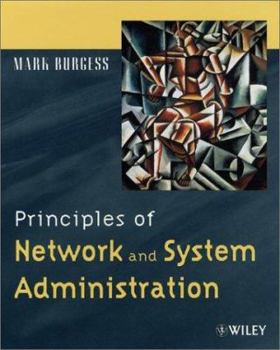Principles of Network and System Administration
Select Format
Select Condition 
Book Overview
A practical guide for meeting the challenges of planning and designing a network Network design has to be logical and efficient, decisions have to be made about what services are needed, and security concerns must be addressed. Focusing on general principles, this book will help make the process of setting up, configuring, and maintaining a network much easier. It outlines proven procedures for working in a global community of networked machines, and provides practical illustrations of technical specifics. Readers will also find broad coverage of Linux and other Unix versions, Windows(r), Macs, and mainframes. The author includes discussions on the social and ethical aspects of system administration.
Format:Paperback
Language:English
ISBN:0471823031
ISBN13:9780471823032
Release Date:July 2000
Publisher:Wiley
Length:428 Pages
Weight:1.75 lbs.
Dimensions:0.9" x 7.4" x 9.2"
Customer Reviews
3 ratings
Organization and Topics Good.
Published by Thriftbooks.com User , 22 years ago
Edited 11/22/02.I bought this over a year ago and was not impressed, initially. However, I am re-reading it in light of new responsibilities, and I'm changing my opinion, slightly.First of all, if you are a serious system administrator, you should own, read, and work to the principles outlined in this book.With that said, there were two items that I felt detracted from the presentation.First was, there was much text devoted to particular operating systems (both *nix and Windows). Whether you're dealing with Linux, Unix, or BeOS, it's the principles that matter, not the implementation.The second was that cfEngine, a systems configuration engine, was used to demonstrate the principles. This works on Unix - and again, detracted from the overall presentation of the "Principles" in the title I bought it for.So, bottom line, the book is worth a read. Spend some time working to understand and apply the principles in your environment. If you can implement some of the specifics of the author's techniques, that's all the better.11/10/02 update: "The Practice of System and Network Administration" is in. Short verdict, it's worth the money.
A pretty good work on the non-technical side of sysadmining
Published by Thriftbooks.com User , 23 years ago
This work is a good one on the non-technical side of system adminsitration. It does not deal with stuff like HOW to install a system, but the WHYs, such as WHY you want to properly document your installations.This sort of work has been needed for a long time, since "The Keys to Successful Unix System Management" went out of print. However, this work may be a bit too academic for many admins. They might find the recent "Practice of System and Network Administration" to be a bit better. If you can afford both, do so.
Peter Salus, Login - June 2000
Published by Thriftbooks.com User , 24 years ago
Peter Salus, Login - June 2000 Another winner! I keep Nemeth et al. and AEleen Frisch at hand for referencing the systems admin tasks we all need to do. Burgess' fine book is something ``completely different.'' It is a well-articulated introduction to a corpus of guiding principles for systems administrators. And as we live in a world of heterogeneity, Burgess ``covers'' Unix, Unix-like, DOS, Windows, Mac, Amiga, and NT systems. Burgess says that he wants to express a sound and logical way to approach networked systems. While I can find nits (that's a reviewers job, isn't it?), I consider this an important book. More and more talk of certification can only lead to a body of knowledge and a set of tenets that are 'required.' I think that Burgess will become part of the required reading for future (and current) systems administrators.






